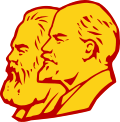| Part of a series on |
| Marxism–Leninism |
|---|
 |
Unified power[a] is the state power principle of communist states, whereby state power, instead of being separated into different branches as Montesquieu called for, is unified, in a supreme state organ of power.
This principle drew inspiration from the Paris Commune established in 1871. This commune established a representative institution, the Commune Council, which had executive, legislative and judicial powers and, therefore, no separation of powers. Karl Marx wrote approvingly of this model, noting that it was "a working, not a parliamentary, body, executive and legislative at the same time."[1]: 61
The constitution of the Russian Soviet Federative Socialist Republic was the first modern state formation to put this system into practice, and designated the All-Russian Congress of Soviets as the highest organ of state power. Vladimir Lenin, the leader of Russia at the time, believed that only through unified power could one govern in the name of the dictatorship of the proletariat.[2]: 55–57
In communist systems, the highest organ of state power works under the ruling party's leadership.
The People's Republic of China's political system, officially referred to as the system of people's congress, is grounded on this principle.[2]: 57–59
See also
[edit]Notes
[edit]- ^ Also referred to as "unity of power", "unitary power", "unified state power" and "unity of state power".
References
[edit]- ^ Davidshofer, William J. (2014). Marxism and the Leninist Revolutionary Model. New York: Palgrave Macmillan. doi:10.1057/9781137460295. ISBN 978-1-349-48849-0.
- ^ a b Fang, Ning, ed. (2020). "Chapter 3: China's System of People's Congresses". China's Political System. China Governance System Research Series. Singapore: China Social Sciences Press and Springer Publishing Company. doi:10.1007/978-981-15-8362-9. ISBN 978-981-15-8361-2. OCLC 1198557413. S2CID 158853804.